areppim: information, pure and simple
The weekly situation report on a set of selected countries. Our plain, one curve, non-linear forecasts illustrate the path followed by the pandemic to date, and provide a clear picture of what is likely to happen in the near future if executives pursue their customary practice, and if no dramatic occurrences trouble the course of events.
![]() Check the situation in selected countries »
Check the situation in selected countries »
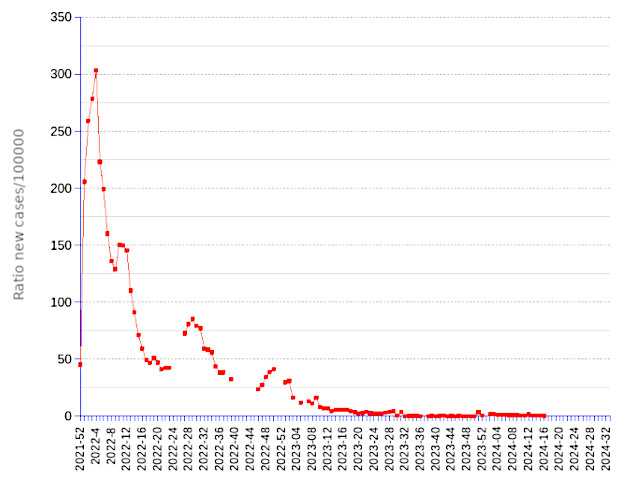
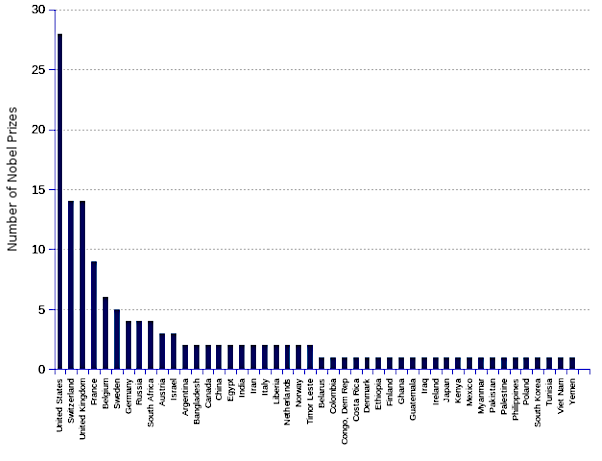
On 6 October 2023 the Nobel Committee announced the award of the Nobel Peace prize to Narges Mohammadi, the Iranian woman-rights advocate, for her fight against the oppression of women in Iran and her fight to promote human rights and freedom for all
. The timing was quite weird. The following day, on the 7th, the Palestinian organization Hamas launched a surprise attack on Israel, adding another pivotal armed conflict to the 18-month old Ukraine war.
Apparently, the Nobel committee was unable to gauge the state of play...
![]() Check the full 1901-2021 Nobel prize details »
Check the full 1901-2021 Nobel prize details »
From constant US$1.8 trillion in 1996, it climbed to 12.7 in 2022. Billionaires make just 0.000034 percent of the world population, but their current wealth is the equivalent of 12.8 percent of the GWP (gross world product). They grow stupidly rich.
![]() Read more »
Read more »
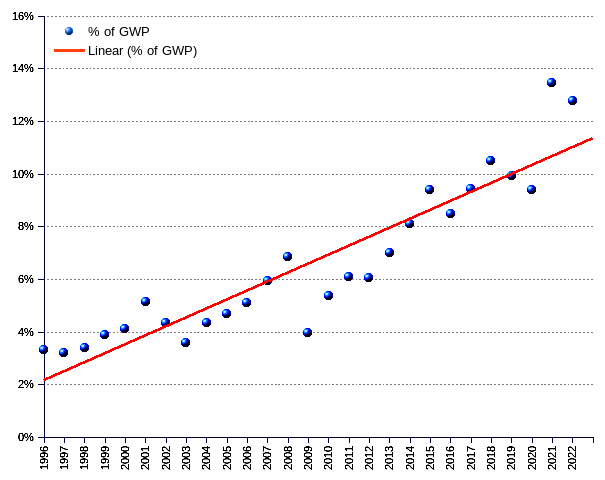
Meanwhile, courtesy of the 2019 pandemic and the 2021 geopolitical crisis, extreme poor
(at below US$2.5 per day) inflate to 660-680 million people worldwide
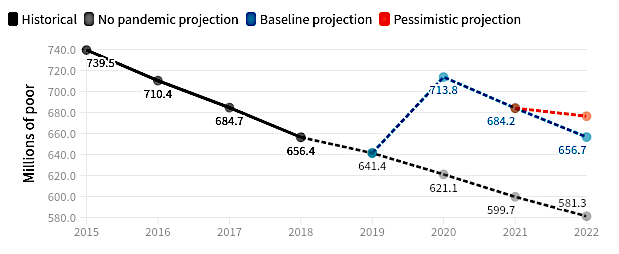 "
"
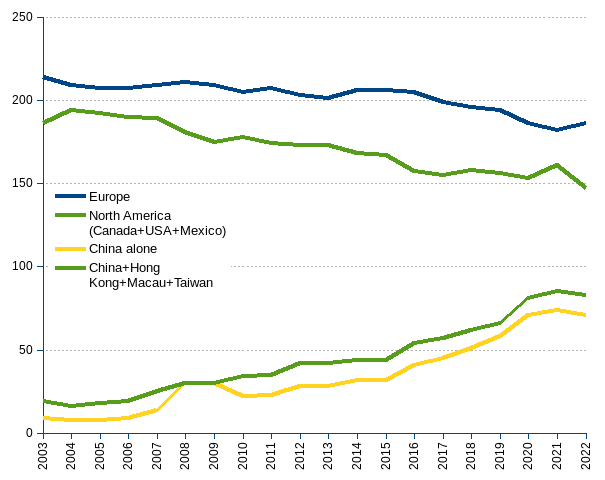
The University is a juicy market, where the main concern is the market share. Attracting more and better students, including foreign ones, becomes a critical success factor. To this end, it is imperative to recruit elite faculties with lots of highly cited publications and hopefully some high caliber prizes. The battle is particularly fierce between Europe, North America and China, each seeking to occupy the top spot. The graph shows how the aggressiveness of China has eroded the shares of the first two, as measured by the number of universities placed among the world top 500. Since 2003, China has progressed at an annual average rate of 11.5% (8.1% without Hong Kong, Macau and Taiwan), against negative values of -0.7% for Europe, and -1.2% for North America.
![]() Check the full 2022 Shanghai university ranking details »
Check the full 2022 Shanghai university ranking details »
In 2020 the world output contracted by 3.3 percent year-on-year. The global support to counter the economic consequences of the pandemic reached 15.3 percent of GDP (Gross Domestic Product).
![]() Read more »
Read more »
To win on tourism you need more than a little bit of luck. Portugal had its lucky days – if ever a deluge of tourists may be seen as a good fortune. But the wheel of luck never stops spinning. The new coronavirus turned the Portuguese scaffold upside down in just a few weeks...
After growing at an average rate of 13.36 percent per year from 2013 to 2019, revenue per room for tourist accommodation stumbled and finished 2020 at less than half the 2019 value (-54.15%).
It had to happen, the coronavirus did it. The Portuguese economy started its journey into hell, courtesy of the Covid-19 pandemic. After the World Health Organization declared the pandemic on March 11, 2020, all the red lights started flashing. The government debt, out of control as usual, has been boosted to a new historical peak of 137.2 percent of GDP in March 2021.
TI's (Transparency International) CPI (Corruption Perception Index) for 2018 opens with a candid acknowledgement.
More than two-thirds of countries score below 50 on this year's CPI, with an average score of just 43. It reveals that the continued failure of most countries to significantly control corruption is contributing to a crisis in democracy around the world. While there are exceptions, the data shows that despite some progress, most countries are failing to make serious inroads against corruption.
...
ITU (International Telecommunications Union) estimates that by the end of 2018 there were 8.2 billion mobile subscribers worldwide, corresponding to a global penetration of 95%. This averages 10.7 mobile phones for 10 living persons.
Our new forecast anticipates a global market size of 8.4 billion subscribers by 2025, at 99.3% of saturation (estimated at 8.5 billion), equivalent to 104% of the population...
![]() Read more »
Read more »
By late 2017, the AHA (American Heart Association) issued new guidelines setting normal blood pressure at less than 120 and 80, and the hypertension threshold at 130 over 80, in place of the previous 140 over 90 benchmark. They also established five, instead of the previous four blood pressure ranges as follows:
| Category | Systolic mm Hg (upper number) | Diastolic mm Hg (lower number) | |
|---|---|---|---|
| Normal | Less than 120 | and | Less than 80 |
| Elevated | 120 - 129 | and | Less than 80 |
| Hypertension Stage 1 | 130 - 139 | or | 80 - 89 |
| Hypertension Stage 2 | 140 or higher | or | 90 or higher |
| Hypertensive crisis | Higher than 180 | and/or | Higher than 120 |
The new guidelines place a large percentage of the previously healthy population in the hypertension category, possibly requiring medical care and medication...
![]() Read more »
Read more »